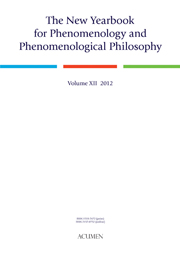Book contents
- Frontmatter
- Contents
- Articles
- Documents
- In Review
- Making Sense of Husserl's Early Writings on Mathematics: Stefania Centrone, Logic and Philosophy of Mathematics in the Early Husserl
- Commentary on Some Themes in Stefania Centrone's Logic and Philosophy of Mathematics in the Early Husserl
- Mathematical Existence, Mathematical Fictions, Etiological Proofs and Other Matters: Replies to Mirja Hartimo and Robert Tragesser
- Stefania Centrone, Logic and Philosophy of Mathematics in the Early Husserl
- Reply to Mark van Atten: on Husserl-Computable Functions
Stefania Centrone, Logic and Philosophy of Mathematics in the Early Husserl
from In Review
- Frontmatter
- Contents
- Articles
- Documents
- In Review
- Making Sense of Husserl's Early Writings on Mathematics: Stefania Centrone, Logic and Philosophy of Mathematics in the Early Husserl
- Commentary on Some Themes in Stefania Centrone's Logic and Philosophy of Mathematics in the Early Husserl
- Mathematical Existence, Mathematical Fictions, Etiological Proofs and Other Matters: Replies to Mirja Hartimo and Robert Tragesser
- Stefania Centrone, Logic and Philosophy of Mathematics in the Early Husserl
- Reply to Mark van Atten: on Husserl-Computable Functions
Summary
Abstract: Mark van Atten reviews Stefania Centrone's Logic and Philosophy of Mathematics in the Early Husserl, which addresses Husserl's technical ideas on mathematics and logic. By ‘the early Husserl’ Centrone means primarily Husserl in the period from the Philosophy of Arithmetic (1891) to the Logical Investigations (1900/1901). The review focuses on what in the reviewer's opinion are the two most important systematic claims in the book: the claim that in the Philosophy of Arithmetic, Husserl defines the class now known as that of the partially recursive functions, and the claim that the notion of (relative) definiteness of an axiom system is to be understood as its syntactical completeness.
Keywords: Stefania Centrone; Edmund Husserl; phenomenology of mathematics
In Stefania Centrone's Logic and Philosophy of Mathematics in the Early Husserl what the author means by ‘the early Husserl’ is primarily Husserl in the period from the Philosophy of Arithmetic (1891) to the Logical Investigations (1900/1901). The book's three chapters can be read practically independently of one another: chapter 1, “Philosophy of Arithmetic”; chapter 2, “The Idea of Pure Logic”; and chapter 3 “The Imaginary in Mathematics.” The first chapter is devoted to Husserl's work of the same name and some related texts; the second, to Husserl's indebtedness to Bolzano; the third, to the notion of definiteness of an axiom system and of a manifold. As far as exposition is concerned, the second chapter is perhaps the most original contribution.
- Type
- Chapter
- Information
- Publisher: Acumen PublishingPrint publication year: 2013



